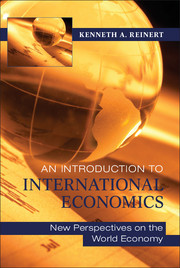Book contents
- Frontmatter
- Summary Contents
- Detailed Contents
- Preface
- Acknowledgments
- Acronyms
- Symbols
- 1 Windows on the World Economy
- I International Trade
- II International Production
- III International Finance
- IV International Development
- 20 Development Concepts
- 21 Growth and Development
- 22 International Production and Development
- 23 The World Bank
- 24 Structural Change and Adjustment
- Glossary
- Index
- References
23 - The World Bank
from IV - International Development
- Frontmatter
- Summary Contents
- Detailed Contents
- Preface
- Acknowledgments
- Acronyms
- Symbols
- 1 Windows on the World Economy
- I International Trade
- II International Production
- III International Finance
- IV International Development
- 20 Development Concepts
- 21 Growth and Development
- 22 International Production and Development
- 23 The World Bank
- 24 Structural Change and Adjustment
- Glossary
- Index
- References
Summary
The late 1970s were a calamitous time for the Ghanaian economy: agricultural and industrial output stagnated, budget deficits and inflation rates increased substantially, a fixed exchange rate regime began to generate foreign exchange shortages, and Nigeria expelled one million Ghanaian citizens, sending them back to Ghana. The political situation deteriorated as well. Flight Lieutenant Jerry Rawlings took power in a coup. Despite the military nature of the Rawlings regime, the International Monetary Fund (IMF) and the World Bank began negotiations with it in 1982. These negotiations led to an official recovery and adjustment program that began in 1983. This was the start of a long relationship between Ghana and both the IMF and World Bank, which lasts to this day. In the 1980s, Ghana became known as the World Bank’s “star pupil,” and Rawlings the father of Ghana’s “economic miracle.” But if Rawlings was the star pupil, what do we know about the teacher, the World Bank itself?
You have a good understanding of the IMF from reading Chapter 17. The World Bank sits across from the IMF on 19th Street in Washington, DC, housed in an architecturally stunning building with a giant atrium, peaceful café, and flowing water. As we mentioned in Chapters 7 and 17, both institutions grew out of the Bretton Woods Conference held in 1944 in the wake of World War II. In the present chapter, we take up the World Bank, or more precisely, the World Bank Group, in earnest. We begin in the following section by considering the early history of the World Bank and its administrative structure. We then consider the Bank’s infrastructure project lending and poverty reduction lending phases. Next, we consider the shift of the Bank to a policy-based lending phase and the application of this approach to Ghana. Finally, we consider recent modifications to policy-based lending within the Bank under its recent presidents.
- Type
- Chapter
- Information
- An Introduction to International EconomicsNew Perspectives on the World Economy, pp. 413 - 434Publisher: Cambridge University PressPrint publication year: 2011
References
- 1
- Cited by



